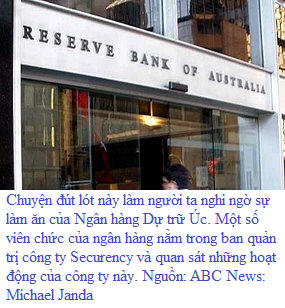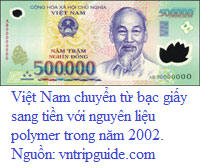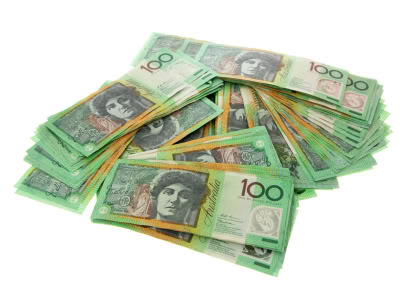Ai ăn 12 triệu đô-la khi Việt Nam chuyển tiền
giấy qua dạng polymer?
 Cảnh
sát Liên bang Úc đang tiến hành điều tra một
công ty mà Ngân hàng Dự trữ Úc làm chủ nữa cổ
phần v́ tội đút lót viên chức nhà nước ngoại
quốc hằng triệu đô-la.
Cảnh
sát Liên bang Úc đang tiến hành điều tra một
công ty mà Ngân hàng Dự trữ Úc làm chủ nữa cổ
phần v́ tội đút lót viên chức nhà nước ngoại
quốc hằng triệu đô-la.
Một viên chức Việt Nam cao cấp đă nhận hơn 5
triệu đô-la như là tiền hoa hồng từ công ty
Securency, như đă được tường thuật.
Theo báo The Age, tiền trả cho viên chức Việt
Nam và công ty của ông ta đă được chuyển đến
trương mục nằm ở nước ngoài, tổng cộng hơn 12
triệu đồng. Thanh tra chính phủ Úc muốn biết ai
là người biết chuyện đút lót này, và khi nào.
Nếu có thật, th́ chuyện hối lộ này là điều trầm
trọng nhất từ xưa đến nay liên quan đến tham
nhũng của Ngân hàng Dự trữ Úc.
Securency là công ty làm polymer, một nguyên
liệu được sử dụng trong đồng bạc giấy của Úc.
Công thức chế tạo polymer đă được đăng kư bằng
sáng chế này hiện đang được 27 nước trên thế
giới dùng làm giấy bạc bao gồm cả Việt Nam. Việt
Nam chuyển từ bạc giấy sang tiền với nguyên liệu
polymer trong năm 2002.
Một thương gia ở Hà Nội tên Anh Ngoc Luong đă
đóng một vai tṛ lớn lao trong chuyện hối lộ này.
Công ty Securency đă thuê ông này v́ ông quen
biết với nhiều người ở cấp cao trong nhà nước
Việt Nam. Người ta ghi nhận là ông và công ty
của ông ta làm việc cho Bộ Công an Việt Nam.
Theo báo The Age, công ty Securency trả cho ông
và công ty của ông ta, CFTD, hơn 12 triệu đô-la,
một số trong số tiền này được chuyển qua những
trương mục ngân hàng nằm ở Thụy sĩ (Switzerland).
Theo luật chống tham nhũng của Úc, đút lót cho
viên chức chính phủ hay những cơ sở làm ăn do
chính phủ ngoại quốc kiểm soát để có lợi thế
trong thương trường là bất hợp pháp cho bất cứ
công ty Úc nào. Nếu cuộc điều tra cho thấy ban
quản trị công ty biết hay có lẽ biết ông Lương
làm việc nhân danh nhà nước Việt Nam, họ sẽ bị
truy tố với tội h́nh sự, với án 10 năm tù.
Chuyện đút lót này làm người ta nghi ngờ sự làm
ăn của Ngân hàng Dự trữ Úc. Một số viên chức của
ngân hàng nằm trong ban quản trị công ty
Securency và quan sát những hoạt động của công
ty này. Nhưng bên cạnh Ngân hàng Dự trữ Úc, c̣n
có những ban ngành khác của chính phủ Úc và Bộ
Ngoại giao và Thương măi cùng làm việc chung với
công ty Securency trên toàn thế giới.
Cựu đại sứ Úc ở Việt Nam ông Richard Broinowski
nói chuyện tai tiếng này đưa đến những vấn đề
nghiêm trọng của chính phủ Úc cần giải quyết.
 "Tôi nghĩ chuyện chính là phải biết những ǵ đă
xảy ra. Úc là một nước đă kư vào luật chống tham
nhũng của thế giới, và đút lót như thế này là
chuyện chúng ta không nên làm. Báo The Age đă
tường thuật lời tôi nói trước đây là Bộ Công an
của Việt Nam là một cơ quan tồi tệ, tôi muốn nói
chỉ với chừng mực đó th́ vâng, bộ có trách nhiệm
lo an ninh công cộng và trong một đất nước như
Việt Nam nó chẳng có ǵ là minh bạch cả," ông
Broinowski nói.
"Tôi nghĩ chuyện chính là phải biết những ǵ đă
xảy ra. Úc là một nước đă kư vào luật chống tham
nhũng của thế giới, và đút lót như thế này là
chuyện chúng ta không nên làm. Báo The Age đă
tường thuật lời tôi nói trước đây là Bộ Công an
của Việt Nam là một cơ quan tồi tệ, tôi muốn nói
chỉ với chừng mực đó th́ vâng, bộ có trách nhiệm
lo an ninh công cộng và trong một đất nước như
Việt Nam nó chẳng có ǵ là minh bạch cả," ông
Broinowski nói.
Ông Broinowski cho rằng ban ngành nào của nhà
nước Việt Nam cũng đáng khiển trách v́ tham
nhũng, nhưng ông có khuynh hướng đổ lỗi cho viên
chức Úc đă biết thế mà không tránh.
"Nhưng tôi thực t́nh muốn nói không phải là cái
tính, cái đạo đức xấu xa hay những mặt khác của
Bộ Công an Việt Nam. Bất kỳ ban ngành nào ở Việt
Nam cũng tệ như như thế hết và viên chức chính
phủ Úc nên biết ai là người đă liên quan."
Ông Lương là giám đốc của một công ty hoạt động
ở Úc có văn pḥng nằm ở Frankston, tây nam thành
phố Melbourne.
Hai năm trước đây, lănh đạo công ty Securency
cho rằng công ty vai tṛ chính của công ty ông
Luong là dịch giấy tờ, công văn, thu xếp các
buổi họp và đón đưa ở phi trường.
--------------------------
RBA's new 'bribe' storm
NICK MCKENZIE AND RICHARD BAKER. October 30, 2009
 THE Reserve
Bank of Australia's banknote firm paid
multi-million-dollar commissions to a senior
Vietnamese official in an apparent breach of
federal bribery laws that carry a 10-year jail
sentence.
THE Reserve
Bank of Australia's banknote firm paid
multi-million-dollar commissions to a senior
Vietnamese official in an apparent breach of
federal bribery laws that carry a 10-year jail
sentence.
Anh Ngoc Luong received more than $5 million in
so-called ''commission'' payments from RBA firm
Securency.
Senior Australian Government sources said Mr
Luong and his company, CFTD, worked for
Vietnam's Ministry of Public Security, one of
the communist-run country's premier security and
intelligence agencies. One of Mr Luong's
partners in CFTD serves in Vietnam's diplomatic
mission to the United Nations.
The payments to Mr Luong and CFTD from Securency
are believed to total more than $12 million,
some of which was sent to secretive offshore
bank accounts in Switzerland..
The Commonwealth Criminal Code forbids
Australian companies paying foreign officials or
government-controlled firms to gain a business
advantage.
Securency hired Mr Luong because of his
high-level government connections, and he has
been Securency's man on the ground and chief
government liaison in Vietnam for several years.
Since 2002, Mr Luong has played a major role in
a deal in which Vietnam switched its currency
from paper-based banknotes to those made with
Securency's patented polymer formula.
The Australian Federal Police has been
investigating Securency, which is half-owned by
the RBA, for five months over allegations that
it breached foreign bribery laws.
If it can be proven that Securency executives
knew or should have known that Mr Luong and his
company worked on behalf of the Vietnamese
Government, they may face criminal charges.
The revelation of the payments to Mr Luong also
raise questions about the conduct of the RBA,
whose officials sit on the Securency board and
oversee its activities, as well as the conduct
of the Australian agencies that work closely
with Securency across the globe.
Senior Liberal MP Philip Ruddock said the nation
had been put on notice by the inquiry into the
Australian Wheat Board bribery scandal in Iraq -
which he set up as attorney-general - that
payments to foreign officials were illegal.
''After the AWB issues, I would have thought all
agencies would be very circumspect of all the
activities they are undertaking overseas and
make very sure they do not breach Australia's
bribery laws … if it [Securency's conduct] did
constitute bribery, it would be a very
significant issue,'' he said.
''We would not expect our officials to moonlight
and receive payments from other governments.''
Australia's former ambassador to Vietnam,
Richard Broinowski, said the Securency scandal
raised serious questions for the Rudd
Government.
''I would have to ask how far the knowledge of
this case extends into the senior management of
the Reserve Bank, Treasury and therefore into
Canberra … into DFAT [Department of Foreign
Affairs and Trade],'' Mr Broinowski said.
''Vietnam's Ministry of Public Security is
indeed a pretty odious agency, and if they are
receiving funding it shows absolutely no moral
scruples on the part of this Reserve Bank
company.''
Several well-placed Australian Government
sources said the Department of Foreign Affairs
and Trade had long believed Mr Luong to be a
government official and his firm an arm of the
Public Security Ministry. One senior source said
CFTD's government connections were ''common
knowledge'' among Australian embassy officials
in Vietnam.
A Securency source said senior company officials
had privately claimed that Mr Luong was a senior
security official.
Mr Luong is also listed as a director of CFTD's
Australian operations, based in Frankston,
Melbourne. A second director and shareholder of
CFTD's Australian firm is Vietnam's attache to
the United Nations and World Trade Organisation
in Geneva, Thuong Minh Do.
Securency and the RBA have refused to explain
why the payments to Mr Luong and CFTD were so
high and sent to offshore accounts, saying it
was inappropriate to comment during a police
inquiry.
In 2007, when Securency executives were quizzed
by an overseas reporter about why their firm was
working with CFTD, they stressed the Hanoi
company's role was limited mostly to the
translation of documents, arranging meetings and
airport pick-ups.
''A lot of the [CFTD's] roles in the early
stages were to do with interpreting and
translating … so that is the primary role they
play. So it is the liaison between the state
bank,'' Securency managing director Myles Curtis
said in the 2007 interview.
* Source:
http://www.theage.com.au/national/rb...1029-hnp5.html

 THE Reserve
Bank of Australia's banknote firm paid
multi-million-dollar commissions to a senior
Vietnamese official in an apparent breach of
federal bribery laws that carry a 10-year jail
sentence.
THE Reserve
Bank of Australia's banknote firm paid
multi-million-dollar commissions to a senior
Vietnamese official in an apparent breach of
federal bribery laws that carry a 10-year jail
sentence.